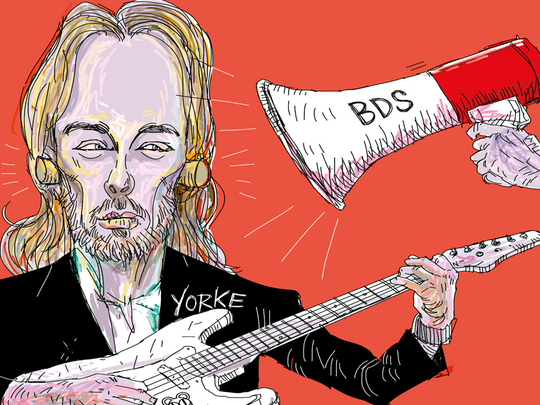
Has Radiohead, the British rock band that has, well, so harmoniously married politics to music, abdicated its responsibility as engaged artists?
Antonio Gramsci, the Italian belle lettrist, whose highly original musings on political theory, linguistics and neo-Marxist thought continue to dazzle readers decades after they were penned — in prison, no less, where died in 1937 at the age of 46 — insisted that intellectuals should be active in the struggle against injustice, wherever injustice is found, for by not doing so they effectively give their approval to the prevailing order.
“Indifference is the dead weight of history”, he averred, adding that all men and women are in fact intellectuals, in that they have intellectual faculties, but not all of them have the social function of being public intellectuals, or what he called “organic intellectuals”, creative individuals who, being in the vanguard of the social order, are involved not merely in building their careers on disseminating ideas — say, composing music, directing films and writing books — but in taking an activist posture in denouncing and forcefully agitating against that injustice.
In short, organic intellectuals represent both response and responsibility. They are not just out there describing social life, but playing an active role in combating the malaise, discontent and alienation that afflict them. You can’t disagree with a theoretician who tells you that we are all complicit in that which leaves us indifferent.
As I wrote this, last Wednesday, Radiohead was performing in Tel Aviv, after having snubbed repeated calls from the Boycott, Divestment and Sanctions movement to cancel the gig, including calls by a number of prominent figures in the art world in Britain and beyond. Months before Radiohead arrived in Israel for their performance, Thom Yorke, who is the lead vocalist for the band, defended his decision to go ahead with his plans, come what may. He told Rolling Stone magazine: “Playing [in] a country isn’t the same as endorsing its government. We don’t endorse [Benjamin] Netanyahu anymore than [Donald] Trump, but we still play in America.” His petulant statement came in direct response to an op-ed piece in the Independent by the eminent, 81-year-old filmmaker Ken Loach, titled ‘Radiohead need to join the cultural boycott of Israel’, in which he said: “Their stubborn refusal to engage with many critics of their ill-advised concert in Tel Aviv suggests to me they only want to hear one side — the one that supports apartheid ... whether apartheid in South Africa in the past or apartheid in Israel in the present. When an oppressed community asks renowned international artists not to lend their names to their oppressors’ attempts to whitewash their human rights violations, it is our moral obligation to heed their appeals.”
The “many critics” Loach referred to included high-profile artists such as Pink Floyd’s Roger Waters, Sonic Youth’s Thurston Moore, and the veteran, wildly popular on both sides of the Atlantic, film director Mike Leigh who, in response to Yorke’s assertion that “art is about freedom of expression, about crossing borders not building them”, wrote: “As the lights go out in Gaza and Palestinian cancer patients are denied travel permits to Israel, Thom Yorke speaks loftily about ‘crossing borders’ and ‘freedom of expression’. One has to ask, freedom for whom exactly?”
Last April, a petition by Artists for Palestine UK, signed by 47 leading cultural figures, including South Africa’s Archbishop Desmond Tutu (who, after a visit to Palestine several years ago, had identified Israeli apartheid to be “much, much worse” than its earlier manifestation in his homeland) pleaded with Radiohead to reconsider — all to no avail.
Yorke, the bonehead from Radiohead, doesn’t get it, does he? When he claims, as he did in Rolling Stone, that “playing in a country isn’t the same as endorsing its government” and that members of his band “don’t endorse Netanyahu anymore than Trump, but we still play in the US” he forgets that an observation like that, catchy though it may be, is meaningless unless contextualised. America, you see, does not practise apartheid, as Israel does, when it builds colonies on Arab land, to be inhabited exclusively by Jews, pave roads to connect these colonies to Israel for the exclusive use of Jewish drivers, and subjects Palestinians to the torment of checkpoints, curfews
and house demolitions.
Yorke does not, I say, get it.
As his band performed before a crowd of 50,000 whooping Israelis in Tel Aviv last Wednesday night, he seemed blissfully unaware that his band’s Palestinian fans were unable to attend, had they wanted to, because Palestinians are just not allowed to travel to wherever they please, as free men and women elsewhere are. Permits to travel beyond that infamous wall in the West Bank are rarely granted to them by their occupiers.
So much for art being all about “crossing borders, not building them”.
And, Oh, yes, lest we forget, defenders of Israeli apartheid have — surprise, surprise — already branded Roger Waters an anti-Semite and Mike Legh a self-hating Jew. The more things change ... well, you know how the rest of it goes.
Fawaz Turki is a journalist, lecturer and author based in Washington. He is the author of The Disinherited: Journal of a Palestinian Exile.








